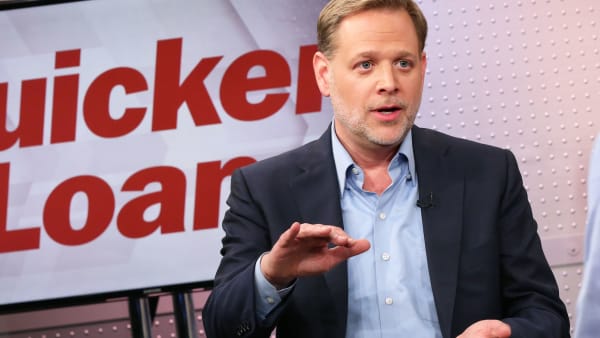CEO of mortgage giant Quicken Loans explains how struggling homeowners can ‘skip the payment’

Source: Matthew J. Belvedere, CNBC
One of the biggest questions for homeowners facing a coronavirus-related financial hardship is whether to try to pause their mortgage payments.
Quicken Loans CEO Jay Farner told CNBC on Wednesday the company wants to educate people that if they “skip the payment,” they’ll still have to pay it eventually.
“Our tool right now is something called ‘forbearance,’” Farner said on “Squawk Box.” “It gives you the opportunity to pause on making your mortgage payments [with] no impact on your credit. But at some time in the future, you have to catch those back up.”
Many of the nation’s top mortgage issuers, of which Quicken Loans is the largest, are working with clients to help them get through the coronavirus-driven economic halt.
Requests to delay mortgage payments grew by 1,270% between the week of March 2 and the week of March 16, and another 1,896% between the week of March 16 and the week of March 30, according to numbers released Tuesday by the Mortgage Bankers Association.
“We’ve grown our servicing call centers by hundreds and hundreds of people all working from their homes, to take the phone calls, answer the questions,” Farner said. “Our technology team stood up a website that allows folks to get those answers as well.”
Farner advises homeowners to “take a deep breath and do the research.” He added, “If forbearance is the right thing, and taking a pause in the mortgage payments without affecting your credit makes sense, then that’s what we’ll do.”
Another phenomenon created by the economic fallout from the outbreak is that interest rates and, in turn, mortgage rates are plunging to historic lows. That’s leading many homeowners to refinance their loans to lower their monthly payments.
The Mortgage Bankers Association said Wednesday, “The 30-year fixed mortgage rate decreased last week to the lowest level in MBA’s survey at 3.45%.” The group has been tracking weekly mortgage applications since 1990.
Those rock-bottom rates fueled a 10% weekly surge in applications to refinance a home loan. Refi volume was 192% higher than a year ago.
“From a refinance perspective, applications have been the strongest we’ve ever seen,” Farner said. “In fact, March was the biggest closing month in our company’s history — nearly $21 billion in mortgages closed.”
“April will be bigger. We did close to $53 billion in the first quarter, and we’re estimating near $75 billion in mortgage applications in the second quarter,” he added.

 USA
USA 






 © Jackson Lieblein, LLC 2015.
© Jackson Lieblein, LLC 2015.
